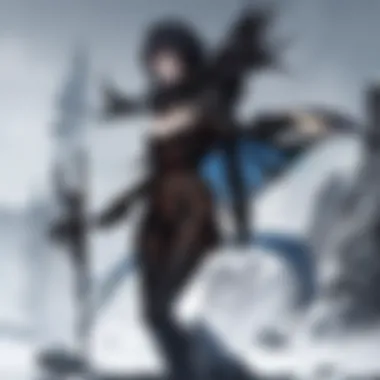Discover Engaging Games Like Overlord: A Guide


Intro
In gaming, few titles manage to blend strategy, management, and exhilaration as effectively as Overlord. This game weaves a tale of dark humor and strategy, placing players in the shoes of an Overlord who commands a horde of quirky minions. As the gaming community continues to expand, many players seek alternatives that capture similar experiences. This guide uncovers games that resonate with fans of Overlord, exploring their unique mechanics and narrative styles.
Series Overview
Synopsis and Premise
Overlord presents players with a rich world brimming with the themes of control, chaos, and morality. The gameplay revolves around commanding a legion of minions to conquer territories and engage in battles, while progressing through a narrative filled with dark humor. Players must navigate a universe where their choices impact the unfolding story. Other games sharing these elements often delve into power dynamics, exploration, and environment manipulation.
Notable Characters
In Overlord, characters like the Overlord, minions, and various foes contribute significantly to its engaging plot. The Overlord, a character of immense power, embodies the player's ambitions and decisions. The minions, each with their distinct personalities, provide comic relief alongside their functionality in gameplay. Other games in this genre often feature similarly charismatic characters that enhance the overall narrative experience.
Themes and Motifs
Major Themes Explored
Across games like Overlord, themes such as dominance, ethical ambiguity, and adventure resonate deeply. Players often grapple with moral choices that challenge their perception of right and wrong. Games like Dungeon Keeper and Darkest Dungeon echo these themes, placing players in morally gray situations where their decisions have far-reaching consequences.
Symbolism in Storytelling
Symbolism plays a crucial role in conveying deeper meanings in narratives. In Overlord, the quaint yet chaotic world inhabited by minions serves as a representation of the player's legacy. Similar games utilize environmental elements and character designs to convey their messages about power, ambition, and morality.
Artistic Style and Animation
Visual Aesthetics and Design
The artistic style of Overlord is rich with whimsical yet menacing visuals. The vibrant colors contrast with the darker themes, creating an immersive atmosphere. The character design ranges from grotesque to comical, enhancing the game's unique charm. Games inspired by Overlord often follow similar design philosophies, emphasizing distinct aesthetics to captivate players’ imaginations.
Animation Techniques and Trends
The animation in Overlord successfully blends humor with action, allowing minions to exhibit varied and entertaining movements. This adds a layer of engagement for players. As games evolve, many incorporate advanced animation techniques that enhance realism, yet still capture the essence of humor, like in Lords of the Realm and Overlord II.
"A well-designed game not only engages players on the surface but also invites them to explore deeper narratives and motivations."
End
As players seek familiar but new gaming experiences similar to Overlord, this guide provides a basis for exploration. By examining thematic, narrative, and gameplay similarities, fans can find compelling alternatives while ensuring an enriched gaming experience.
Preamble to Overlord
In the gaming landscape, Overlord holds a unique position. It intertwines elements of strategy and action within a rich narrative context. This mix invites players into its darkly humorous world, where they command minions to conquer lands and crush enemies. Understanding Overlord is essential, especially when drawing parallels to similar games. The essence of its gameplay and storytelling reveals much about player engagement and design philosophy in the gaming industry.
Overview of Gameplay
Overlord features an intriguing mix of action and strategy through its core gameplay. Players take on the role of an evil overlord, commanding small creatures known as minions. This concept allows a different approach to traditional role-playing games. Instead of a single hero, players manage multiple minions, each possessing unique abilities. This creates layers of strategy, where players must decide when to attack, defend, or collect resources. The graphics and sound design complement this gameplay, enhancing the overall experience.
Cultural Impact and Reception
The cultural footprint of Overlord is notable. Upon release, it received acclaim for its engaging mechanics and narrative depth. Critics noted its inventive gameplay that allowed players to explore a morally ambiguous world. The game's humor and charm attracted many fans, turning it into a beloved title in the gaming community. Over the years, Overlord led to discussions about villainy in games and how players engage with the concept of evil. This has influenced new titles inspired by its design and narrative themes. Players often reminisce about their experiences in forums such as reddit.com, highlighting its lasting impact.
The significance of understanding Overlord goes beyond mere appreciation; it helps define a genre that merges strategy with narrative in innovative ways.
Defining Criteria for Similarity
In examining games that resonate with the essence of Overlord, it is vital to establish clear criteria for similarity. This helps in identifying which aspects truly reflect the unique elements of the game, ensuring a focused exploration. The importance of defining these criteria lies in creating a structured analysis that readers can rely on. By doing so, an informed selection of games can be presented, leading to a richer understanding of the shared mechanics, themes, and character development prevalent in this genre.
Common Gameplay Mechanics
A fundamental aspect that defines any game is its gameplay mechanics. For those familiar with Overlord, the distinct elements such as control of minions, resource management, and strategy dictate the player's experience. Games featuring similar mechanics typically offer players a blend of strategic planning and action. Players often find enjoyment in manipulating units or characters to achieve objectives, evoking a sense of power and command similar to what Overlord provides.


This aspect not only enhances the gameplay experience but also cultivates engagement among players. For instance, in Dungeon Keeper, the management of creatures and design of dungeons mirrors the same principles of control found in Overlord. Recognizing these mechanics helps players select alternative games that deliver comparable satisfaction.
Narrative Themes
Narrative themes serve as an essential pillar in unearthing games similar to Overlord. The narrative in Overlord involves darker, sometimes humorous tones in combination with the overarching narrative of conquest and domination. Games that share these themes often invite players to explore moral ambiguity, character motivations, and the consequences of power. Titles like Evil Genius exemplify this with its theme of villainy and strategic manipulation.
Understanding the importance of these thematic elements allows players to appreciate the narratives in other games. Furthermore, it provides insights into character motivations, story depth, and world-building. This contributes to a more immersive gaming experience as players become invested in the unfolding stories and their complexities.
Character Development
Character development is another integral aspect of games like Overlord. In this game, players not only manage minions but also shape their overlord's abilities and attributes. This development is crucial for creating a sense of progression and achievement. Other games that mimic this aspect usually offer players choices that affect their characters’ paths, relationships, and growth.
For example, Fable III emphasizes this with its moral choices, guiding the character's journey and decisions. The depth of character development not only enriches the gameplay but also heightens emotional connections, allowing players to identify with their characters. Such relationships can change the way players experience the game, making it a fundamental area of focus when considering titles similar to Overlord.
Recommended Games Similar to Overlord
The selection of games similar to Overlord holds significance in enhancing the gaming experience for fans of the genre. These titles incorporate familiar mechanics, themes, and character interactions that resonate well with what players enjoy in Overlord. As an exploration of such games unfolds, the discussion will highlight notable characteristics and gameplay benefits which align with the expectations set by Overlord. Understanding these similarities allows players to find fresh yet relevant experiences while diving deeper into nuanced gameplay elements.
Dungeon Keeper
Core Gameplay Mechanics
The core gameplay mechanics of Dungeon Keeper revolve around managing a dungeon while battling against surface heroes. This aspect provides a rich layer of strategy, focusing on resource management and tactical planning. Players employ a blend of offensive and defensive strategies, a characteristic appreciated for its challenge and depth. The unique feature here is the interaction with minions who are essential in sustaining the dungeon’s operations. This allows for a dynamic approach in gameplay, offering flexibility and creativity in planning. Such characteristics make it a beneficial choice for players who seek similar tactical complexity found in Overlord.
Player Experience Analysis
The player experience in Dungeon Keeper centers on the thrill of dominion and control. This offers a sense of satisfaction as players see their strategic decisions manifest. The feedback from in-game actions creates an engaging loop, encouraging experimentation. The ability to defend against invaders while simultaneously managing dungeon inhabitants enhances immersion in the crafted world. This interconnectedness in player actions can lead to both positive and negative outcomes, fostering an insightful experience for those familiar with Overlord's gameplay dynamics.
Comparison with Overlord
Comparing Dungeon Keeper with Overlord showcases notable similarities in strategy and player role. Both games invite players to adopt the persona of a commander, overseeing minions and undertaking quests or battles. However, Dungeon Keeper emphasizes more on defensive strategies whereas Overlord blends combat and exploration. This interaction between the two genres presents a rich field of comparison, making Dungeon Keeper a valuable addition for fans. The alternative approach to player agency—emphasizing an antagonist rather than a classic hero—draws parallels that represent a shared thematic essence.
Evil Genius
Gameplay Dynamics
Evil Genius excels in offering layers of strategic gameplay that emphasize base-building and villainy. Players take on the role of a mastermind, conducting nefarious activities while fending off heroic interventions. The combination of time management and strategic placement provides engaging gameplay. This unique feature allows players to balance the establishment of their evil empire with defense and combat, increasing overall depth, making it an engaging pick for those who enjoy Overlord’s layered approach.
Character Interaction
Character interaction in Evil Genius is driven by the relationships between the player’s minions and their master. Unique interactions can alter the dynamics of gameplay, supporting the development of a player’s empire. The ability to engage with characters and manipulate their traits results in varied gameplay experiences. This adds a meaningful element to character-driven narratives, a significant aspect for Overlord fans who appreciate character depth.
Similarities in Theme
The thematic concerns in Evil Genius anchor around villainy and world domination, akin to the narrative impulses found in Overlord. The focus on creating complex narratives involving the player's rise as a powerful antagonist creates a connection. Players are motivated by the very traits that draw them to Overlord; exploring morally gray areas and the execution of grand plans offers a familiar sense of purpose.
Total War: Warhammer
Strategic Gameplay Elements
Total War: Warhammer is rooted in strategic gameplay elements that demand player skill and foresight. The game provides a balance between real-time tactics and turn-based strategy. Key characteristics such as large-scale battles and comprehensive army management create a deeply engaging experience. This complexity and the variation in outcomes based on player choices contribute significantly to the gameplay dynamic, aligning with Overlord’s rich strategic nature.
World-Building Features
World-building in Total War: Warhammer shines through its elaborately crafted environments and lore. Players navigate a world rich in detail, which enhances the overall immersion. The unique feature lies in its intertwining of lore and gameplay; players feel connected to the narrative and histories of the factions they control. This immersive world resonates well with those who appreciate the narrative setups in Overlord.
Hero Management
Hero management serves as a critical aspect in Total War: Warhammer. The interplay between powerful heroes and army units offers avenues for tactical depth. Characters can evolve, acquire unique skills, and significantly influence battle outcomes. This adds an engaging layer of complexity that mirrors the summoning and managing of minions in Overlord, thus creating a relevant connection in terms of gameplay mechanics.
Fable


Narrative and Choices
Fable III invites players into a richly layered narrative where choices wield significant consequences. The narrative structure encourages exploration of moral dilemmas and personal impact, emphasizing a clear connection to Overlord’s storytelling ambitions. The decisions players make not only enhance engagement but also shape the world around them, providing a rewarding experience for those who value impactful storytelling.
Character Customization
Character customization in Fable III stands out, allowing players to mold their protagonist to reflect individual preferences. This element deepens player identification with in-game characters, promoting a unique connection. The ability to style one’s character diversifies gameplay and strengthens the personalization aspect inherent in Overlord.
Theme Analysis
Fable III navigates themes of power, leadership, and moral consequences, which overlap with elements found in Overlord. These thematic concerns enhance the gameplay experience, allowing players to explore the consequences of their actions in different settings. The moral weight of player choices offers depth, making Fable III an enriching counterpart worth exploring.
War for the Overworld
Direct Inspirations
War for the Overworld is heavily inspired by Dungeon Keeper, reinforcing its approach to dungeon management and strategy. This direct lineage provides players with familiar mechanics while introducing new elements. The homage to its predecessor enriches the experience for fans of Overlord seeking something that pays tribute to their favorite gameplay styles.
Unique Features
The inclusion of unique features, such as varied races and classes, distinguishes War for the Overworld. Players can control minions with specific abilities, enriching strategic possibilities. This diversity enhances defense and offense functionalities, making the game a robust choice for those who enjoy dynamic gameplay similar to Overlord’s.
Gameplay Variations
War for the Overworld presents variations in gameplay through its blend of real-time strategy and simulation. These variations enhance the experience as players adapt to different technologies and features. This variety reflects a commitment to providing a fresh experience while adhering to familiar mechanics, thus creating a fruitful exploration for Overlord enthusiasts.
Spellforce Series
Real-Time Strategy Elements
The Spellforce series integrates real-time strategy elements with role-playing, creating a distinct hybrid. The ability to control units while developing a character allows players to engage in a multi-faceted gameplay experience. This engaging blend of genres offers strategic depth similar to Overlord’s approach to controlling multiple minions.
Character Building
Character building in Spellforce allows for extensive customization, enabling players to strengthen characters according to their playstyle. Such feature promotes engagement and satisfaction, reminiscent of Overlord’s character development. Players can fine-tune abilities, adding a personal touch that enhances the emotional connection to the game.
Story Depth
Story depth in Spellforce is notable, with rich narratives weaving through gameplay. The intricate storytelling dynamics echo the narratives seen in Overlord, where questing and character journeys take precedence. Such depth aligns with player expectations for detailed storytelling, making it a worthy choice for exploration.
Overlord
Direct Sequel Analysis
Overlord II continues the legacy of the original game, enhancing core mechanics while introducing new elements. Players experience further development of the Overlord’s reign, deepening the engagement with familiar gameplay styles. This direct sequel fulfills the desire for more content while retaining much of what players loved about the original.
Improved Mechanics
Improved mechanics in Overlord II streamline gameplay for enhanced player experience. The optimization of control schemes and strategic elements reflects a strong understanding of player preferences. These advancements contribute to a more fluid, engaging experience, making it a direct improvement for those familiar with Overlord.
Expanded Themes
Expanded themes in Overlord II delve deeper into morality and decision-making, providing a richer narrative landscape. The reflection on themes of power, revenge, and dominion adds layers to gameplay and story—a critical aspect for engaging players seeking more profound narratives akin to Overlord.
Crusader Kings
Political Strategy and Management
Crusader Kings III places a premium on political strategy, blending empire-management mechanics with personal character arcs. This comprehensive approach allows players to focus on broader strategies while navigating individual relationships—a great source of engagement for fans of complex strategy games like Overlord.
Character Relationships


Character relationships play a crucial role in Crusader Kings III. This mechanic allows for nuanced interactions, creating dynamic storytelling possibilities. Strong relationships can lead to alliances or rivalries, enriching gameplay by introducing multiple pathways influenced by earlier decisions, mirroring the player-driven narrative reminiscent of Overlord.
Impact on World Events
The impact of character actions on world events serves as a defining element in Crusader Kings III. Choices ripple through the world, affecting political landscapes, wars, and the fates of realms. This depth of influence aligns closely with themes in Overlord, where player decisions lead to substantial game changes.
Book of Demons
Unique Visual Style
Book of Demons captivates players with its unique visual style that integrates a papercraft aesthetic. This artistry introduces charm while maintaining cohesion with the themes of dungeon crawling and strategy. Such an intriguing feature catches the eye and keeps players invested in gameplay—a beneficial attribute for those attracted to aesthetic considerations.
Game Structure
The structured approach in Book of Demons aids players in navigating the narrative effectively. The linear format guides player engagement and allows focus on essential gameplay elements. The coherence lends itself to clarity, offering ease of entry for players who enjoy Overlord’s straightforward yet engaging narrative style.
Exploration Elements
Exploration in Book of Demons is rewarded through discovery and playstyle adaptation. Each level offers distinct challenges that entice players to experiment with different strategies. This element of allure mirrors the explorative approach of Overlord, making it an intriguing choice for those looking for an engaging experience within a clearly defined framework.
Sins of a Solar Empire
3D Strategy and Interaction
Sins of a Solar Empire brings a 3D strategy experience that transforms traditional gameplay through its scale and interaction. The open world invites players to establish an empire through tactical maneuvering and real-time battles. This feature is significant, as players can exert control similarly to managing minions in Overlord.
Empire Management
Empire management stands at the center of player experience in Sins of a Solar Empire, where players outline long-term strategies. This focus allows for the construction and management of economic systems, reflecting the thought-provoking challenges found in Overlord. Players explore expansive dynamics contributing to overall engagement and satisfaction.
Combat System
The combat system in Sins of a Solar Empire emphasizes strategic decision-making, requiring players to assess situations and deploy units effectively. Such depth offers ongoing challenges, appealing to those accustomed to Overlord's expectations for engaging, thoughtful gameplay. Players find satisfaction in mastering combat intricacies, amplifying their overall gaming experience.
Analyzing the Player Experience
Understanding the player experience is critical in discussing games similar to Overlord. This aspect focuses on how players engage with the game, including their emotional responses and engagement levels. Each player’s experience can differ greatly, influenced by individual preferences and gameplay style. Analyzing player experience helps identify what makes a game enjoyable and memorable, allowing developers to create more engaging narratives and gameplay elements.
Engagement and Immersion
Engagement refers to how connected players feel to the game world. Immersion is about how well players can lose themselves in it. Both are vital in creating a rich gaming experience. Games like Overlord often create a strong bond between the player and their decisions. This sense of agency allows players to feel a level of control, enhancing engagement. Players want to feel that their choices hold weight. By examining player choices and actions, games can foster deeper investment in the story.
- Dynamic Environments: Games that allow players to manipulate their surroundings can significantly boost immersion. In Overlord, the player commands minions, a feature emphasizing player control and interaction with the game environment.
- Feedback Systems: Games utilizing responsive feedback loops build a more engaging experience. Visual and audio cues affirm player choices, making actions feel impactful.
- Narrative Depth: A strong narrative grabs players’ attention. Games that employ intricate plots and character backstories enhance emotional ties, drawing players to invest both time and thought into the experience.
Relationship with Characters
Characters often serve as the emotional anchor in games. Players relate to them, developing connections that enhance the gameplay experience. In titles similar to Overlord, characters represent the moral dilemmas players face, allowing for reflection on their own choices. Building strong relationships with game characters can lead to more robust player engagement, impacting how players perceive the overall narrative.
- Character Development: A well-crafted character arc can create attachment. Players may feel sadness or joy as characters evolve based on player choices.
- Moral Quagmires: Ethical dilemmas engage players intellectually. Games that challenge players with difficult choices create a more profound relationship with the story and characters.
"Character dependencies can create a more compelling narrative, making each decision weightier, cementing the player's place within the story."
- Emotional Resonance: Relatable characters with layered personalities encourage players to empathize. These connections lead to memorable experiences long after gameplay has ended.
End
The exploration of games similar to Overlord holds significant relevance for both enthusiasts and casual gamers alike. This article provides insights that illuminate the connections between various titles and their shared mechanics, narrative themes, and character development aspects. By examining these similarities, we help readers discern which games may resonate with their preferences as they transition from Overlord.
Future Outlook on Game Similarities
As the gaming industry continues to evolve, understanding the future of game design will become increasingly important. Developers are likely to draw inspiration from established franchises while also embracing innovation. Trends such as adaptive storytelling, evolving gameplay mechanics, and community engagement are likely to shape upcoming games. An increased focus on multiplayer experiences may also influence how themes similar to Overlord are integrated. Players can expect to see new interpretations and fresh takes on the genre, allowing for rich gameplay experiences that honor the essence of their predecessors while pushing the boundaries.
Final Recommendations and Insights
For those who enjoyed Overlord, the recommended titles in this guide offer not just entertainment but also thoughtful engagement with complex gameplay and narrative depth. Dungeon Keeper, for example, invites players to strategize in ways that extend beyond mere numbers. Evil Genius provides a humorous yet strategic take on the villain experience, while Total War: Warhammer introduces grand-scale battles paired with rich lore. Each game selected has hallmark traits that make them worthy contenders for fans.
In summary, this comprehensive examination is more than just a list of games; it is an invitation to explore a broader spectrum of gameplay that appeals to diverse players. Whether seeking new challenges or stories, the gaming landscape presents numerous avenues for discovery. Engage with these titles, and immerse yourself in the unique experiences they offer.



